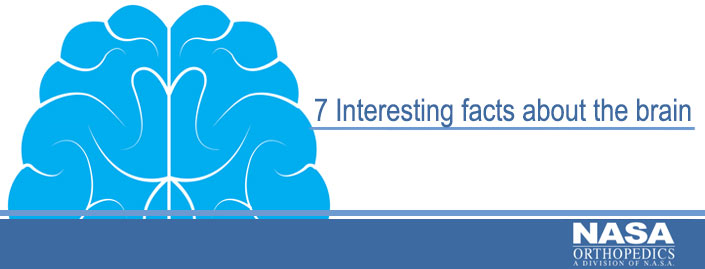The Brain Game: 7 Interesting Facts About the Brain

Brains by the Numbers
These number related facts about the human brain are sure to impress.
There is a galaxy of neurons inside each of us
It is widely stated that there are approximately 100 billion neurons transmitting information in the brain. Actually, recent estimates have upped that number to around 120 billion neurons. 101 billion of those neurons are working away in the cerebellum, and the remaining 21 to 26 billion neurons are transmitting information within the cerebral cortex.1
… and each of our individual brain galaxies are populated with synapses
Every one of those 120 billion neurons has between 1,000 and 10,000 synapses. Do the math and that equals about 1 quadrillion synapses. These synapse allows the neuron to pass its message on to the next neuron through an electrical or chemical signal.
That means your brain is capable of up to 1 quadrillion conversations with itself!2
Back in the Good Ol’ Brains
What we know about brains today is vastly different from the way brain function was considered in the past. Here are just a few ways people thought differently about that space between your ears.
The Ancient Greeks started out great
An ancient fellow by the name of Alcmaeon of Croton is considered to be the first person to think of brain as the structure that held the idea of the mind, with sensations and governing faculties contained within. Hippocrates held similar beliefs.
… and then Aristotle came along
Aristotle, while contributing much to philosophy, missed the mark on brain functions. He thought of the heart as the center of thought, and the brain as air conditioning units for our blood. This cooling system chilled our hot-blooded animal nature. And because we had bigger brains than your average mammal, he concluded we were more rational.
While cooling the body is a system that our brains handle, we’ve since discovered that they do significantly more than that.3
Impress your friends and terrify your enemies with these gems of 21st century brain related knowledge
Modern life, it turns out, may not be great for our brains.
The Incredible shrinking brain
Brain volume has been decreasing over the past 20,000 years. Male brains have lost a tennis ball size area of brain, and women have lost the same amount proportionality. Two beliefs have sprung up around this discovery. The first is that we’re getting dumber. The second is that we’re becoming more efficient. We like to think it’s the second option, but until more time is spent on research, the jury is still out on this one.4
 As the brain shrinks, so shrinks our attention span
As the brain shrinks, so shrinks our attention span
In 2000, the average attention span was approximately 12 seconds. The data was checked again in 2015 and the average had dropped to 8.25 seconds. That’s .75 seconds less than the attention span of a goldfish.5
Image: Suggestions to help improve your attention span: Meditate, Exercise, Drink Water, Write notes by hand
And this one’s just for fun

You can’t tickle yourself
Go ahead, give it a try
This is one of our favorite ice breakers. Ask someone if they can tickle themselves. They won’t be able
to because of a fascinating brain process that happens in the cerebellum. The cerebellum’s main role is motor control. It takes information from the body’s sensory system and uses it to perform tasks with coordination and accuracy.
It also stops you from being able to tickle yourself. The ability to monitor movement also turns the cerebellum into a kind of movement psychic. It predicts what it will feel like to be tickled and sends a cancel message to the rest of the brain f
unction involved in the tickling process.6
